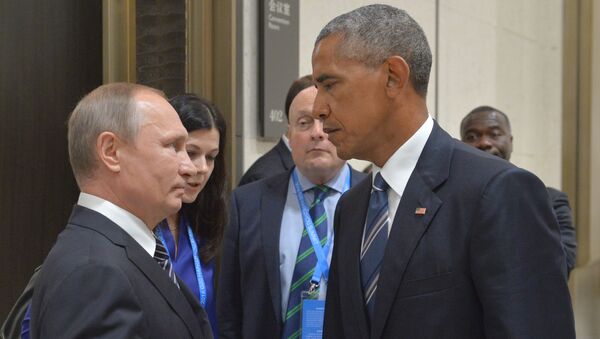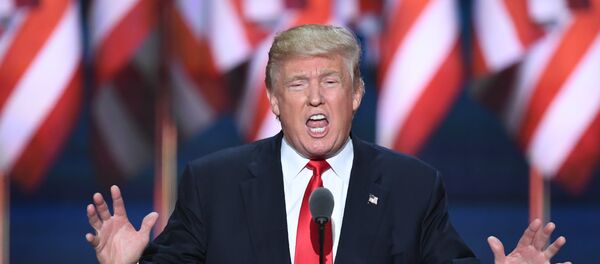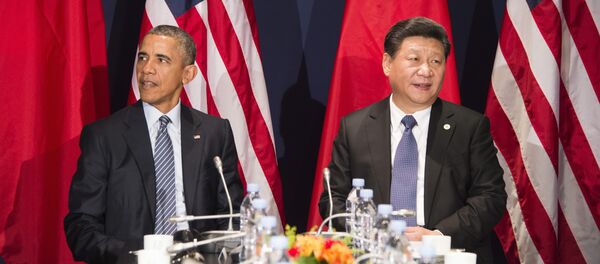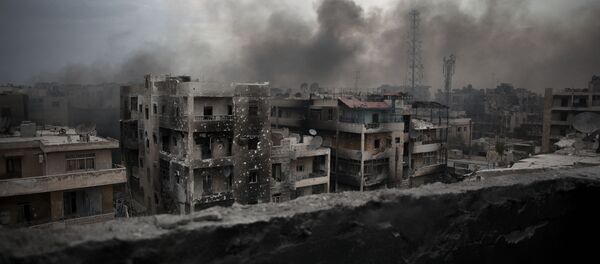Following the G20 conference in Hangzhou, President Obama said that the issue of Russian hackers invading America’s cyberspace was a critical issue he raised during the summit amid a bout of anti-Russia hysteria in the United States provoked by claims that Putin has converted Republican nominee Donald Trump into an agent of the Kremlin in addition to concerns regarding the DNC Leaks.
"We have had problems with cyber intrusions from Russia in the past," but he cautioned that the United States would not immediately seek to play into a "cycle of escalation."
"What we cannot do is have a situation where this becomes the wild, wild West, where countries that have significant cyber capacity start engaging in unhealthy competition or conflict through those means," said Obama.
It was then that President Obama hurled headlong into threatening a cyber war against Russia saying, "Look, we’re moving into a new era here where a number of countries have significant capacity. And frankly, we’ve got more capacity than anybody, both offensively and defensively."
The comments made by President Obama do not exist in a vacuum with the White House initiating a federal probe into Russian intervention in the 2016 presidential campaign following a letter by Senator Harry Reid to FBI Director James Comey asserting that Putin may alter Election Day results to benefit Trump who he referred to as a treasonous agent of Russia in three out of five paragraphs.
Reid’s claims and the ensuing investigation follow in the wake of the much publicized DNC email dump by WikiLeaks that exposed a concerted scheme by Hillary’s campaign to collude with the DNC and mainstream media pundits to spin false narratives about her primary election opponent Bernie Sanders.
While Russia has denied any involvement in the leak, the Hillary campaign claims that Russian hackers had breached their systems and occupied the DNC server for over a year conflating the issue of a hack and the leak. In previous election cycles, both political parties have been hacked by as many as a dozen countries that seek to garner information on the potential next president of the United States.
Hysteria took full force last week when it was reported that the election systems of Arizona and Illinois were breached by hackers with officials immediately pointing the finger at Russia despite a lack of evidence. What was actually hacked in Illinois, however, was not an election system, but rather a voter file that is already accessible to people online with names, phone numbers and party affiliation – supposedly 200,000 or so records were "exfiltrated" (copied and pasted) which is hardly anything of value to a state actor.
In Arizona, a hacker obtained the login key for an employee at the Gila County Recorder’s office, but no voter records were modified. Due to redundancies in Arizona’s electoral system, even if a record were modified it would have no effect because three different government agencies maintain a file of voters.
Not only has Russia faced continued insinuation that they are responsible for hacks that have potentially impacted the tone and tenor of the 2016 election cycle, but the country has also come under fire due to Trump’s former campaign manager Paul Manafort’s connection to former Ukrainian President Viktor Yanukovych who Russia favored.
From there, theories have been concocted that a three-star US General who was America’s top intelligence official, Michael Flynn, was somehow in league with the Russians because he attended a Gala to celebrate Russian funded news station RT’s 10th anniversary. Green Party candidate Jill Stein has faced similar personal accusations of disloyalty to the country for her attendance at the same event.
President Vladimir Putin vehemently denies the allegations of Russia’s involvement in the DNC leak saying "I don’t know anything about it and on a state level Russia has never done this" but regarded the transmission of the information of potential malfeasance by Hillary’s campaign and the DNC as a "public service."





